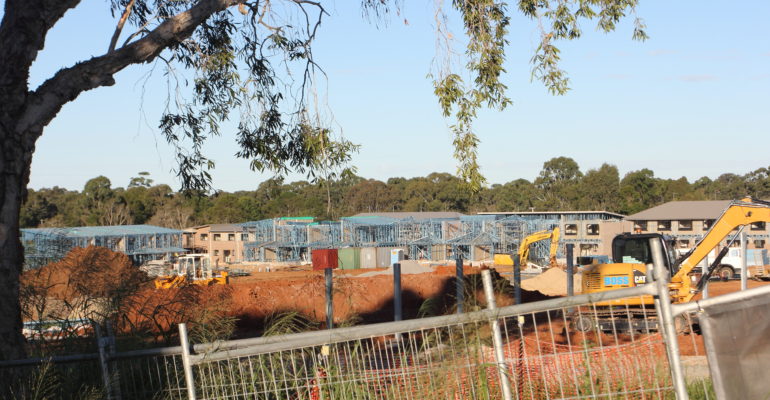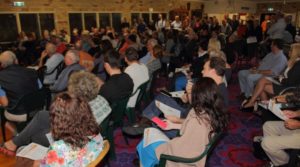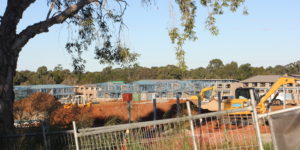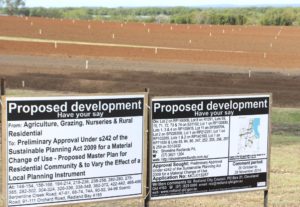

Deputy Premier and Planning Minister Jackie Trad
The Palaszczuk Government has asserted its commitment to planning reform.
This is set out in a paper issued recently by Deputy Premier and Planning Minister Jackie Trad.
“Queensland needs a fair and practical planning and development assessment framework to secure the long-term liveability, sustainability and prosperity for our communities, both now and into the future,” Ms Trad said.
“I want residents to have a strong voice in the planning and development decisions that affect the neighbourhoods and communities where they work, live and play.” she added.
Here is a link to the document:
Directions Paper, Better Planning for Queensland: Next Steps in Planning Reform
Another call for planning submissions
The Directions Paper is said to outline the Government’s commitment to create a planning system that is fair, open, transparent that enables responsible development and delivers prosperity, sustainability and liveability for now and into the future.
The claims are that the Government recognises the need to:
- enable better strategic planning and high quality development outcomes
- ensure effective public participation and engagement in the planning framework
- create an open, transparent and accountable planning system that delivers investment and community confidence
- create legislation that has a practical structure and clearly expresses how land use planning and development assessment will be done in Queensland
- support local governments to adapt to and adopt the changes.

150 local residents meet to discuss a proposed residential development in Birkdale
Many in the community were relieved when the previous Planning and Development Bill lapsed. Former Minister Seeney’s Bill was seen as gearing up to trash community rights. Redlands2030 discussed concerns about the Seeney proposals in: New planning laws threaten community rights.
Interestingly, the Department’s website gives an assurance that any submission to the previous Bill, such as that by Redlands2030, has been (i.e. already) considered. It is hoped the Minister ensures the submissions are examined in the light of her path ahead and does not presume the old Bill had credence outside a small cohort of pro-development interests.
Perhaps the Minister should secure a fresh set of technocrats to deliver the new Planning Bill so as to distance herself (and the Government) from the lapsed Bill.
First thoughts: fix the “fuzzy logic”

Residents in the Redlands are discussing why this sort of development gets approved
The community is assured is that there will be several opportunities to provide a submission as the new planning bill progresses. One hopes then that the Government comes out to the communities and finds out what local communities are concerned about.
Initial reading of the Discussion Paper raises several significant concerns.
First is the fuzzy logic at the beginning. In particular, the overall trilogy objective of “prosperity, sustainability and liveability”. It is progressive and should be warmly supported, but the principles and goals following do not match that trilogy; and sustainability and liveability are largely absent from the text of the Paper.
The text is heavily focused on the process of planning and neglects the twin primary purposes of planning, which are to secure property rights and to secure the public interest in land use – the rights of landowners on the one hand; and of neighbours and communities on the other.
Planning legislation since the Integrated Planning Act 1997 has been much too flexible. This is the cause of many of the problems in the Redlands. A need for certainty is called for by the development industry but not the certainty of a NO. Flexibility suits applicants but not neighbours and communities.
Second, the text slips in the term “economic growth” as a purpose of planning!
Yes, planning can facilitate economic activity by simplifying development approvals (cutting red tape) and then securing decisions so that industry and everybody else knows where they stand. But that is different from conceiving planning as a means of “stimulating economic growth”.
If the new Bill is intended to be about stimulating economic growth, then how many development application will ever be rejected?
Private enterprise should be the engine that drives economic growth. Planning is to secure the public interest.
The aim of planning: protect the public interest

High density developments are attracting concerns about past planning decisions
These observations may seem semantic, but the scrambled up objectives in the first few pages of the Discussion Paper are a set of flashing lights and our community should monitor how this omelette of ideas is played out.
More difficult than simply criticising the text is to conceive of what is missing. First cut ideas, that the community could press for include:
- environmental sustainability to be one of the foundation guiding principles/objectives embedded at the front of the legislation;
- a statutory requirement for all planning applications to be considered by local governments in open public session
- stronger conflict of interest provisions to prevent undue developer influence on local government decision making
- enhanced ability for State departments to say “no” based on State interests
- enhanced compliance with zoning and provisions for “no go” areas. In other words certainty for the industry AND the community
- bring fixation with “injurious affection”, or down-zoning, in line with other jurisdictions, to help fix past planning mistakes
- remove appeal rights against zoning decisions by Councils (as in New South Wales), and restore the weight to community interest.
- a restructured court with funding and other provisions to make it easy for councils to defend refusals
- restore the balance in the appeal process so community groups can participate in the legal proceedings (and not risk house & home)
In fairness the new Government has to deal with the expectations of those stakeholders who were involved in the drafting of the Seeney era Planning Bill. But given the limited array of those stakeholders, a more balanced and credible approach is an essential “starting point”. The Minister should look beyond those claiming some special insight into statutory planning. The world is much bigger than that mindset. A mindset that has caused so much angst and past failures … where planners have been able to develop a planning system for planners and insiders, NOT people.
The Shoreline example

Shoreline notice of proposed development
A local failure unfolding before the community is the example of the proposed Shoreline development in southern Redlands by way of an MCU application. The land is outside the Urban Footprint and outside the urban zoning of the Redlands Planning Scheme. The Government processes to date that have facilitated progress of this massive project gives the community no confidence in the old planning system.
Community Actions:
1. Any suggestions from Redlanders as to the issues the new planning framework should consider or entail please add by way of comment to this post (below).
2. Alternatively make your comments directly to bestplanning@dilgp.qld.gov.au or by filling out the online feedback form.
3. Alert the Deputy Premier Ms Jackie Trad of any abiding concerns by writing to her or emailing her this post on: deputy.premier@ministerial.qld.gov.au
Opinion: Redlands2030 – 28 May 2015
Please note: Offensive or off-topic comments will be deleted. If offended by any published comment please email thereporter@redlands2030.net
The responses by Redlands 2030 and the commentators and EDO cover a considerable area across thousands of pages of legislation,associated legislation and policy areas , and these are uncovering the new Labor trilogy of liveability ,sustainability and prosperity(jobs and infrastructure and growth) as opposed to perhaps the previous ESD?. These terminologies are losing meaning . This new trilogy which needs challenging is morphing into 3 principles, without the decades of established planning principles, with the forces of BCA, COAG , the Productivity Commission,state government. and new legislation foreign to the Environment, Social Planning and recognised Climate Change .
Some areas of governance (Local Government Act , Quangos and Infrastructure)also need review as well as; a compact on Green Space legislation(and Green (fauna) Infrastructure), programs and delivery , Biodiversity Legislation and the future independence of population studies and combination of Planning Need , Cost Benefit Analysis and Total Impacts of projects put into Business Cases. The frameworks by Geoff Edwards and Brian Feeney are fundamental , but need extensions and branch additions of some of the lessons of hundreds of community group and conservation group cases won and recently mostly lost. The number of call ins are needed.
The return to legislation, staffing, programs and practice of 2011 (Not guaranteed in “A better Way for Planning)is no longer sustainable when Climate Change is ignored and when balance is a dirty word and dirtier practices of offsets, much of CODE, and one stop shop remain unsustainable and unacceptable.
Much more needs to be said.
CODE= X FILE$$
OFFSETS = LOCAL EXTINCTION
The wins in Qld and positive outcomes in NSW need collation to go forward
This is my list of what the new Act should cover:
• retain ecological sustainability as the purpose of the Planning Act including a clear definition of what it is
• explicitly require all entities to advance the purpose of the Act
• do not use the separate approval process for priority development areas in the Economic Development Act but use Planning Act processes (amendment may be required) with proper community consultation
• reinstate State Planning Policies with substantial policy content to replace the inadequate Single SPP
• reinstate specialist referral/advice agency processing of DAs triggering referral
• retain the criteria in Planning Act for key planning scheme content rather than giving the Minister discretion to decide on key elements of planning scheme content without reference to parliament (as proposed in the LNP’s draft Planning and Development Act)
• restore the content of regional plans to their full pre-LNP scope
• include community consultation on alternative scenarios for draft regional plans as was done for the metro Portland (Oregon) 2040 Growth Concept ( http://www.oregonmetro.gov/sites/default/files/natureof2040.pdf) rather than just asking the community to comment on a predetermined draft regional plan
• require councils to consult the community on the proposed policy direction to be taken with a new planning scheme (previously called a statement of proposals);
• require councils to provide a supporting document summarising the evidence to support the approach taken in a new planning scheme or major amendment (previously called a planning study); this will include an evaluation of the social, economic and environmental changes that have occurred under the previous planning scheme
• the evaluation of these changes will require councils to set up and maintain a database that puts together on an ongoing basis information generated as part of development assessment (e.g. changes in water quality, social impacts, flooding impacts etc) and other relevant information generated by council or state agencies . For areas expecting large population growth (like Gold Coast), it’s particularly important to have regular evaluation reports (say every 5 years) to ensure that the environmental and social impacts of growth are within acceptable limits. Portland (Oregon) provides an example of how this could be done – see http://www.portlandoregon.gov/bps/article/408710
• the previous LNP government seems to have taken a ‘hands off’ approach to requiring good planning practice in relation to local interests (i.e. not state interests). In the case of the draft Gold Coast City Plan 2015, this resulted in insufficient protection of diverse local character, taking instead too much of a ‘one size fits all’ approach. The state needs to resume oversight of planning schemes to ensure that schemes are able to deliver the key outcomes required not just for state interests but also for the community generally.
On closer examination The Directions Paper is rubbish.
It is within the modern style of policy papers that the public service in both Queensland and Canberra puts out. It is a collection of motherhood statements, cobbled together without any lucid train of logic, with no practical recognition of the pros and cons of each of the issues, no real identification of the problems, and no feasible paths to get from the motherhood statements into practicality.
Who writes writes these things?
Some read as though they are done in the ministers’ offices not the department.
If done in the department, it seems the agency has been cleansed of people with content, knowledge and a passion to make things better and no understanding of why things are now less than optimal.
The credibility of planning as a profession is at an all-time low and it is more and more divorced from the community it is supposed to serve. It has adopted role of facilitating urban development.
The ALP State Policy Platform is as good a place to start as any, especially given the “fuzzy” nature of the discussion paper: The Platform includes laudable commitments (or at least intentions) such as……
7.8 Labor introduced statutory regional planning, which limited urban sprawl and protected the majority of metropolitan areas from inappropriate urban development.
7.9 Labor legislated a Sustainable Planning Act, which placed ecologically sustainable development at the core of development planning and assessment.
7.150 Labor will restore a balanced planning system that is focussed on the three core objectives of liveability, sustainability and prosperity.
7.152 Labor will ensure planning considers the full range of needs for community formation, including sufficient land supply for residential, employment, retail, educational, community facilities and open space uses.
7.153 Labor will ensure that high-quality urban design and place-making underpins new development, with a strong emphasis on public and active transport to support more compact and walkable communities.
7.154 Labor will develop and implement healthy planning principles that recognise the important link between community design and health outcomes.
7.155 Labor will establish appropriate protections for sites with national, state or local heritage values.
7.157 Labor will deliver for each region of Queensland new statutory regional plans that effectively integrate land-use planning and infrastructure planning.
7.158 Labor will publish regular reports, supported by measurable data, on the progress of implementing each regional plan, as well as on their social, economic and environmental impacts and benefits.
7.159 Labor will establish genuinely consultative and collaborative decision-making structures that ensure Local Government and local communities can participate effectively in the process of regional planning.
7.164 Labor believes that public scrutiny of, and the right to object to, resource and urban development proposals is an important part of an open, transparent and accountable democracy. Labor will reinstate statutory notification rights and public objection rights for resource and urban development proposals.
7.169 Labor will protect and enhance South East Queensland’s green space through retaining a statutory urban footprint
If achieved, planning will be much improved, but the recently released discussion paper is wide of the mark.
Minister for Transport Jackie Trad needs to be alerted to the increasing traffic issues in Redlands due to non-stop development..code assessable. Capalaba residents were dumbfounded when, without public consultation, six 6-storey apartment bldgs were approved Cnr Mt Cotton/Redland Bay/Moreton Bay Rds Capalaba, CODE ASSESSABLE! July 1st nursing home with over 130 beds will open its doors adjacent to 4-way intersection Old Cleveland Rd E/Finucane Rds intersection.
Driving home Carindale-Capalaba yesterday 3:30 p.m.bumper to bumper traffic much of the way…parts of road is busway but merging traffic cause bottlenecks. No sign of bus lane Capalaba-Bne City so until there is a solution to relieve traffic congestion, the massive SHORELINE development outside the urban footprint of some 4000 homes in S Redland Bay should be put on hold for now to avoid gridlock…
The Sustainable Planning Act is say 684 pages. There are other parts of it not mentioned and the Institutional Arrangements , SARA, SPP, QPP, SEQ RegionAL PLAN pLAN, The Offsets Act , etc etc ,Vegetation Management Act which no longer protects 6,900 hectares of H.V. Regrowth Koala Habitat in Redlands . The TIMELINE in the Discussion Paper omits the critical CODE and Alternative Solution implementation and the loss of all the EISs, Triggers and Column 5 rejections and gutting of Strategic Plans and supporting documents and the draconian green light for development Offsets Act 2014.
The UDIA mantra is “UNFINISHED BUSINESS” 1997 (fast track & rollback)and industry generation of urban myths like”High Density will generate a range of commensurate green space”: There is no statutory requirement anywhere to provide green space. The urban footprint jumpout has competitors like zonal creep, PDAs. LAPs and spot rezonings and CODE DEVELOPMENT
TED FENSOM Coordinator BREC 38012097
Can the state govt then put on hold any large scale development and change the code assessable/impact assessable impact statement that make it possible for the public to have a say on any development that occurs in their neighborhoods – we are all sick and tired of suddenly seeing small unobtrusive signs suddenly appearing stating a large development will take place in our midst!